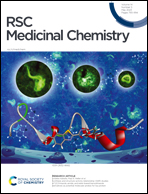Ferrocene modified analogues of imatinib and nilotinib as potent anti-cancer agents†
Abstract
The unique features of ferrocene and the need for development of targeted anticancer drugs inspired the design, synthesis and biological evaluation of ferrocenyl modified tyrosine kinase inhibitors by replacing the pyridyl moiety in imatinib and nilotinib generalized structures with a ferrocenyl group. A series of seven new ferrocene analogues were synthesized and evaluated for their anticancer activity in a panel of bcr–abl positive human malignant cell lines using imatinib as a reference drug. The metallocenes exhibited a dose-dependent inhibition on malignant cell growth with varying antileukemic activity. The most potent analogues were compounds 9 and 15a showing comparable or even superior efficacy to the reference. Their cancer selectivity indices suggest a favorable selectivity profile, indicating a 250 times higher preferential activity of 15a towards malignantly transformed K-562 cells and an even twice greater one (500) of 9 in the LAMA-84 leukemic model as compared to the normal murine fibroblast cell line.



 Please wait while we load your content...
Please wait while we load your content...